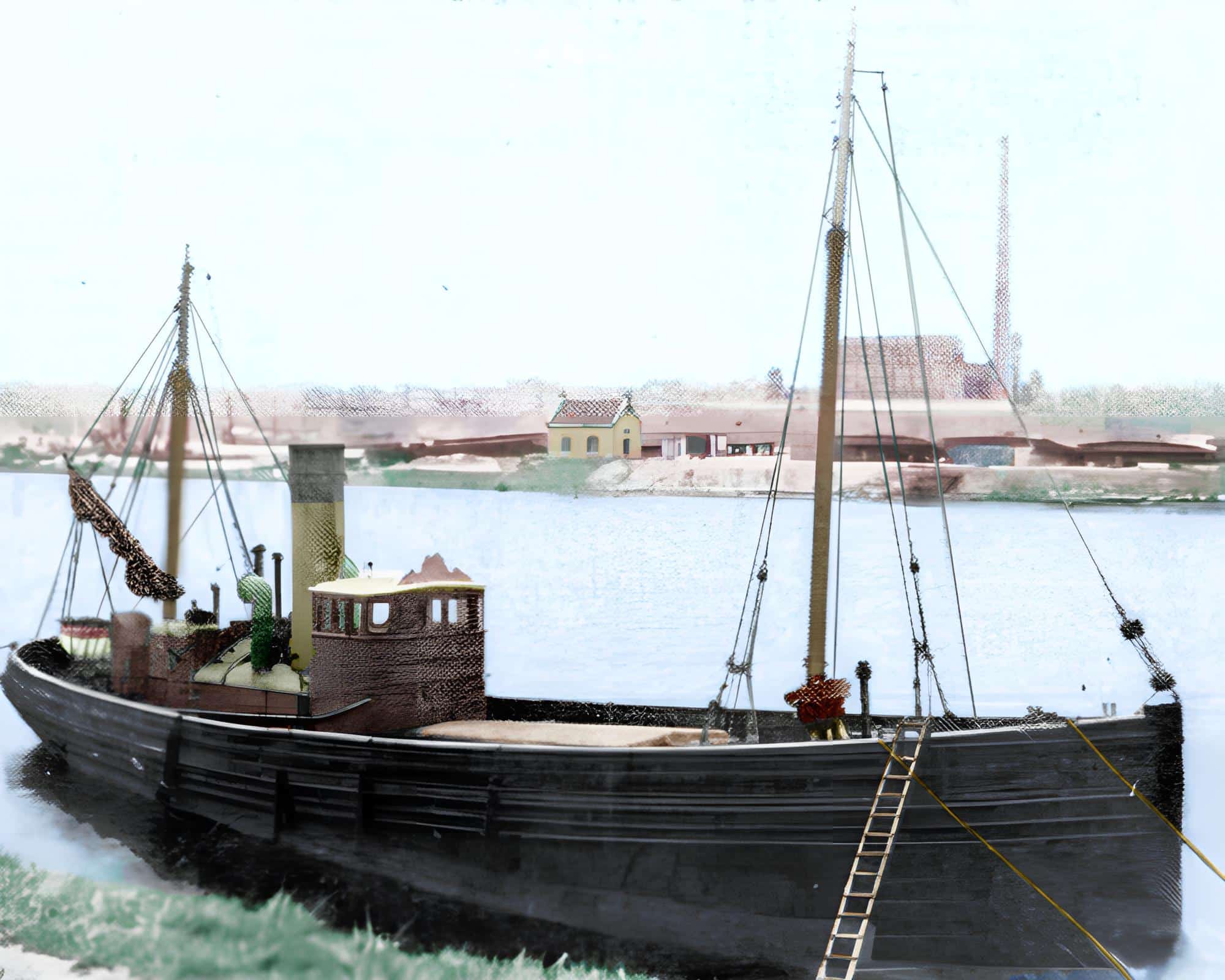Ship details: A small wooden-hulled screw steam drifter, used as a fishing cutter, British-registered (in Lowestoft, Suffolk) with a crew of six (captain, four stokers/deck hands and a cook) to which were added the broadcaster and a radio technician.
Off No. 135743
Built in 1913 by Crabtree & Co, Great Yarmouth
110grt – 38nrt – 91.2 x 20.2 x 10.6ft – T3cy – 25nhp
Owned by Gilbert & Co Ltd, Lowestoft LT33
1915-1919 Admiralty service as netlayer
Offshore radio station: Sender der Deutschen Freiheitspartei (German Freedom Party Radio) from January to April 13th 1938 on 38.25 metres in the short-wave band. The broadcasts were made by the Deutsche Freiheitspartei (DFP, which means German Freedom Party), a strongly conspirational group formed in 1936-37 in London and Paris by exiled conservative, liberal and social democratic Germans.
Carl Spiecker (* 7.1.1888, † 18.11.1953), one of the Paris leaders of the DFP, was the key figure behind the offshore radio station. After World War II he joined Konrad Adenauer’s CDU and got a ministerial position in the Land government of North Rhine-Westphalia.
Ernst Langendorf (* 15.12.1907, † 7.12.1989, after World War II leading Radio Free Europe’s German branch) about the offshore radio broadcasts: “The first ‘editor’ and broadcaster was Jakob Altmaier [* 23.11.1889 † 8.2.1963, later on SPD member of the West German Bundestag]… but after a few days he gave up, as the working and living conditions aboard the dirty, primitive coal-fuelled ship in the stormy January seas were altogether too much for him… I arrived in Dieppe in mid-January. Despite the strong seas, which had confined the whole fishing fleet in Dieppe to harbour, we left Dieppe next afternoon for the open sea. But after a few hours I was soaked to the skin by the waves breaking over the ship and quite hors de combat from sea-sickness. Ready to die I took to my small cabin. The captain turned the ship around and we ran for harbour. In the night the storm died down and by the following afternoon the sea had calmed down sufficiently for us to put to sea again. This time everything worked. The Dutch technician from Radio Hilversum got the apparatus ready to broadcast (electricity was provided by a petrol-driven motor). We broadcast on 38,25 metres short wave. At 7.30 p.m. I sat at the microphone and read the announcement: ‘This is the radio of the German Freedom Party.’ Then followed news, a press review (of the international press), a commentary and various items of information. Broadcast period thirty minutes interrupted regularly by the announcement, ‘This is the radio of the German Freedom Party’, with the wave length and times of the broadcast (daily from 7.30-8.00 p.m. and from 10.00-10.30 p.m.).”
“This continued for several weeks, in fact for three months altogether (I can’t remember the exact dates). A few times the broadcast period had to be shortened or the broadcast completely abandoned as a result of my sea-sickness. We only touched land when we had food or newspapers to collect. I took the news for the daily broadcasts from monitoring German, English, French and Swiss broadcasts. I wrote the commentaries with the help of the literature I had brought on board. Whenever we put into port, I telephoned Dr Spiecker in Paris who gave me further tips, information, advice and references. I provided myself with newspapers and journals. Everything ran well until the beginning of April. On docking I rang Dr. Spiecker who said that we should stay in harbour, he would arrive there the next day for an important discussion. On his arrival he told us that as a result of changes in Paris he expected difficulties over our broadcasting; his contact at the Quai d’Orsay had advised him that it would be a good idea to disappear from French territorial waters until the situation had become clear. After some discussion we followed the advice of the Dutch technician, who recommended we should go to the Dutch port of IJmuiden.”
They duly went there. Langendorf was panicked by the appearance of a German with a swastika in his button-hole revealing his activities. The Dutch treated him with great kindness but said he could remain only a few days in Holland. The ship went back to England, the radio was stored in a warehouse in Boulogne and Langendorf returned to Paris to find that Spiecker had hired a comfortable motor yacht which was being fitted out in Boulogne. Unfortunately the yacht caught fire on a trial trip (petrol spilt in the galley) and the ship was a total wreck. Spiecker disbanded the exercise.
The exercise was clearly not a cheap one. Even at Depression prices Spiecker was responsible for wages and sustenance for eight men at sea, plus fuel (coal and petrol for the generator), plus the cost of the radio equipment, fitting out the trip and so on. If Spiecker had actually hired a motor yacht, then refitted it, only to see the whole thing go up in smoke, as he told Langendorf, he would have required two injections of capital…
It is assumed that Spiecker’s Freedom radio was supported by Sir Collin Campbell Stuart’s ‘Department E.H.’ at Electra House (the Imperial Communications Centre on London’s Victoria Embankment). Its brief was to devise and plan all forms of propaganda. There was perhaps also tacit support from The Secret Intelligence Service’s counter-intelligence arm, Colonel Dauncey’s ‘Z’ organization.
Location: The cutter broadcast from international waters off the French coast, basing itself on Dieppe and Cherbourg.
Source of this text: D. Cameron Watt: “The Sender der deutschen Freiheitspartei: A First Step in the British Radio War against Nazi Germany?”, in: Intelligence and National Security, Vol. 6, No. 3 (1991), pp. 621-626 (published by Frank Cass, London)
Read: An Offshore Radio Station Against Hitler

